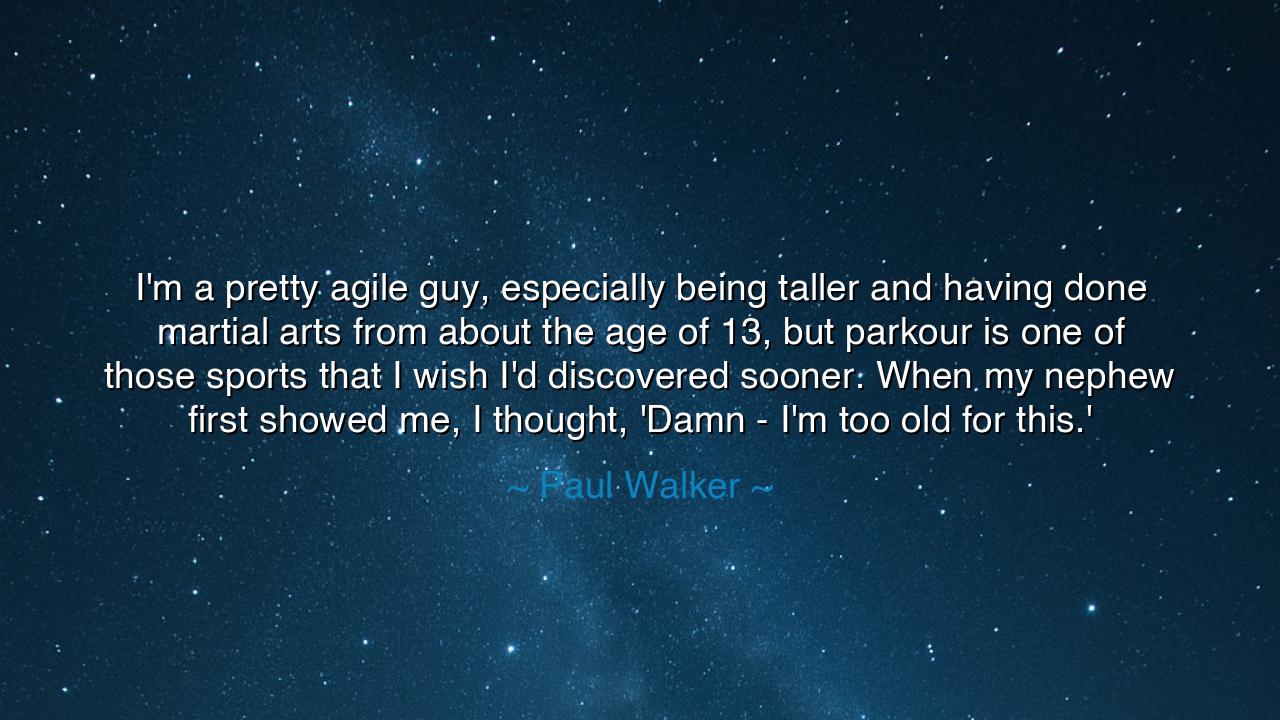
I'm a pretty agile guy, especially being taller and having done
I'm a pretty agile guy, especially being taller and having done martial arts from about the age of 13, but parkour is one of those sports that I wish I'd discovered sooner. When my nephew first showed me, I thought, 'Damn - I'm too old for this.'






The actor and seeker of speed, Paul Walker, once confessed: “I'm a pretty agile guy, especially being taller and having done martial arts from about the age of 13, but parkour is one of those sports that I wish I'd discovered sooner. When my nephew first showed me, I thought, 'Damn—I'm too old for this.’” In these words lies more than the passing regret of a man who missed a sport; it is the universal lament of opportunity glimpsed too late, and the eternal struggle against the limits of time and age.
This quote reveals the paradox of life: that even the strong, the agile, the youthful of spirit will one day meet the wall of limitation. Walker, trained in martial arts, proud of his speed and grace, saw in parkour a discipline that called to him with freedom and daring. Yet by the time he discovered it, his body no longer answered with the same recklessness as his spirit. His words echo the ancient wisdom: there is a season for all things, and the missed season, once gone, does not return.
History offers many such echoes. Alexander the Great, though conqueror of nations, wept when told there were no more worlds to conquer, for though his spirit was restless, his opportunity was bound by the span of his life. Likewise, the poet Li Bai of China often wrote with longing of places he had not traveled, adventures he had not seized, though his youth was filled with brilliance. Walker’s regret is gentler, but the truth is the same: no matter our strength, there will always be doors we wish we had opened sooner.
And yet, hidden within his words is also a tribute to humility. For Walker does not cling to false pride; he admits his limits with honesty. He says, “I’m too old for this,” not with bitterness, but with an almost playful acceptance. This humility is itself wisdom: to know what is beyond reach, yet to admire it still. In a world that urges us always to claim mastery, Walker teaches us that it is noble also to honor what we cannot do, to rejoice in the vigor of others even when it has passed from us.
The meaning of this reflection, then, is twofold: first, seize opportunity while it is near, for time is a thief; and second, when opportunity has passed, do not despair, but carry gratitude for the paths you did walk. Walker had his martial arts, his films, his adrenaline-fueled adventures—he did not need parkour to define his agility. And yet he cherished the thought of it, admired the art, and accepted with grace that it belonged to another season.
The lesson for us is clear: do not wait too long to pursue the callings that stir your heart. If you dream to learn, to move, to create—begin today, for tomorrow may close the door. But also, if some doors remain unopened, do not let regret poison the blessings you have lived. Instead, let admiration kindle joy, let humility remind you that no one life contains everything. There is honor both in seizing opportunity and in bowing to time.
Thus, Paul Walker’s quote endures not as sorrow, but as a torch. It teaches us to run swiftly toward our passions while we can, to live boldly while the body and spirit are strong. And when age or circumstance halts us, it teaches us to look back with gratitude and forward with peace, knowing that life is not measured by the things we missed, but by the depth with which we embraced the things we did. In this way, even the words “I was too old for this” become not defeat, but wisdom for the generations to come.






AAdministratorAdministrator
Welcome, honored guests. Please leave a comment, we will respond soon